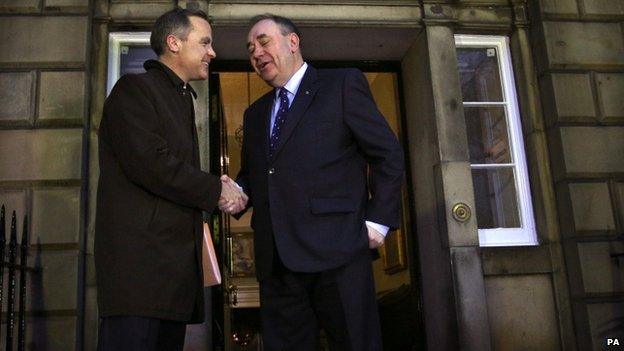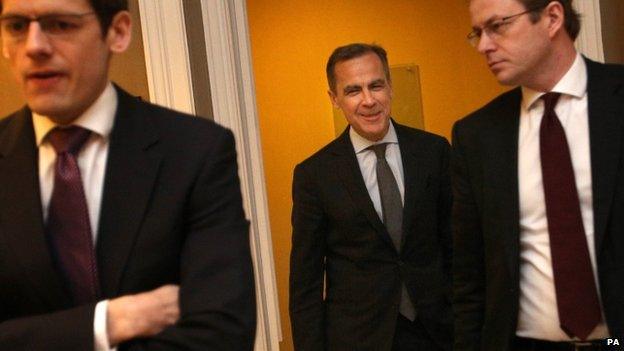Scottish independence: Carney says Scots currency plan may lead to power loss
- Published
Mark Carney: "A durable currency union requires some ceding of national sovereignty"
The Bank of England governor has said an independent Scotland would need to give up some power to make a currency union with the rest of the UK work.
Mark Carney said such a move, proposed by the Scottish government, "requires some ceding of national sovereignty".
He also said the risks of not having a strong agreement had been demonstrated by problems in the Eurozone.
Mr Carney's comments, in Edinburgh, came ahead of the Scottish independence referendum, on 18 September.
Scotland's Finance Secretary John Swinney welcomed Mr Carney's speech, saying it had recognised the benefits of a currency union.
Alistair Darling, leader of the Better Together campaign to keep the Union, argued the governor's remarks were "devastating" for the Scottish government's currency plans.
In the event of a "Yes" vote, the Scottish government said keeping the pound and retaining the services of the Bank of England, under a formal currency union agreement, was the best option for Scotland and the rest of the UK.
The UK government had said such an agreement would be "unlikely", and the deal would result in Scotland effectively having to hand over control of interest rates and borrowing levels to a foreign country.
In his speech, external, Mr Carney stressed arrangements for a currency union in the event of independence would be a matter for the Scottish and UK parliaments.
He added: "If such deliberations ever were to happen, they would need to consider carefully what the economics of currency unions suggest are the necessary foundations for a durable union, particularly given the clear risks if these foundations are not in place.
"Those risks have been demonstrated clearly in the euro area over recent years, with sovereign debt crises, financial fragmentation and large divergences in economic performance."
Mr Carney, who was speaking at an event hosted by the Scottish Council for Development and Industry, went on: "The euro area is now beginning to rectify its institutional shortcomings, but further, very significant steps must be taken to expand the sharing of risks and pooling of fiscal resources.

Mark Carney met Alex Salmond at the first minister's official residence, ahead of the speech

Mr Carney agreed to provide "technical" analysis of the issues ahead of the referendum
"In short, a durable, successful currency union requires some ceding of national sovereignty.
"It is likely that similar institutional arrangements would be necessary to support a monetary union between an independent Scotland and the rest of the UK."
Earlier, Mr Carney, who has agreed to provide "technical" analysis of the issues ahead of the referendum, met privately with Scottish First Minister Alex Salmond.
Scottish Finance Secretary John Swinney welcomed Mr Carney's speech, including what he said was a confirmation that that Bank of England would implement whatever monetary arrangements were put in place, if independence happened.
Mr Swinney said the points made by Mr Carney had been investigated in detail by the Scottish government's Fiscal Commission, external.
He said: "The benefits of a currency union are clear for both sides in terms of issues like promoting investment, eliminating transaction costs, reducing borrowing costs and facilitating the movement of labour and capital, and we welcome the governor's recognition of these benefits.
"An independent Scotland will control 100% of our own revenues, compared to the 7% of our tax base we are currently responsible for under devolution.
"A shared currency will mean an independent Scotland having control of tax policy, employment policy, social security policy, oil and gas revenues, immigration policy and a range of other levers to suit our own circumstances, helping to grow our economy, create jobs and secure a more prosperous and fairer society."
But Mr Darling, the former UK chancellor, said: "There is one clear message from today's thoughtful speech by Mark Carney the Governor of the Bank of England - that the failings of the Eurozone show that to have a successful monetary union you require fiscal and political union.
Alistair Darling on a currency union: "It can only work if you have increased economic and political union"
"This is a detailed speech but make no mistake, the governor's judgement on currency unions is devastating for Alex Salmond's currency plans.
"Why? Because the whole point of independence is to break the fiscal and political union that makes monetary union possible."
Mr Darling added: "The governor has spelled out in stark terms the problems of a currency union - above all it needs people living in the rest of the UK to agree to something they have never been asked about."
Scottish First Minister Alex Salmond said his breakfast meeting with Mr Carney had gone "extremely well"
A spokesman for Prime Minister David Cameron said that it was of no "great surprise" that on technical issues the governor of the Bank of England would want to set out his views.
He explained: "The issue around currency is an important part of the debate that is currently going on in Scotland. It hardly seems a great surprise at all, on the technical issues, that the governor of the Bank of England might want to set out his views.
"I'm sure the people of Scotland will want to be as well-informed as possible."
The independence referendum will see voters in Scotland asked the yes/no question: "Should Scotland be an independent country?"